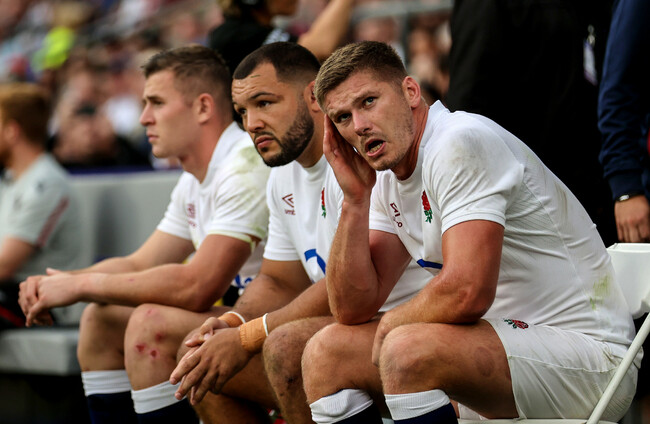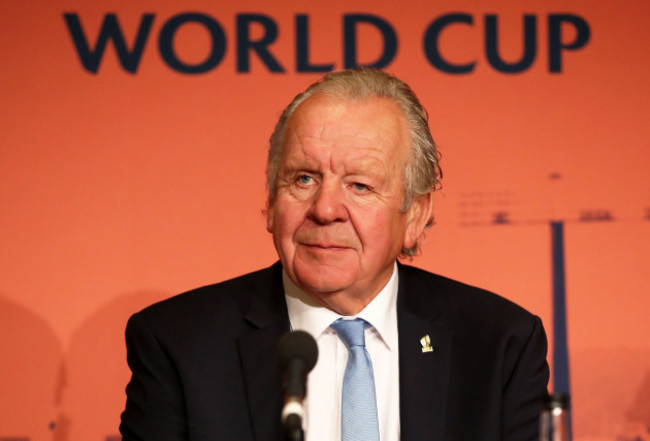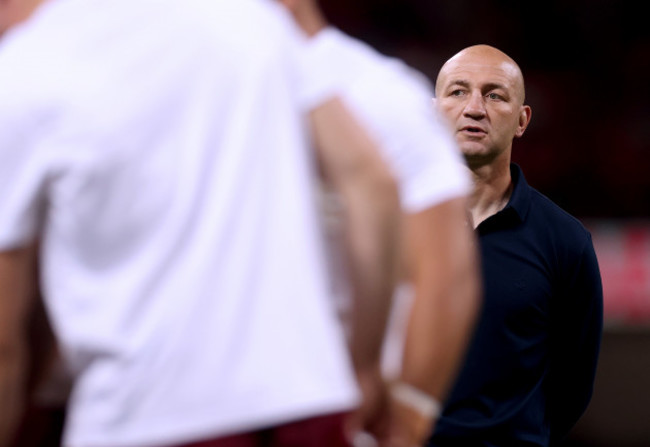WORLD RUGBY DIDN’T need even half of the 48 hours they had to make up their minds about appealing the Owen Farrell disciplinary decision. As soon as they had digested the written report from the independent committee, the call was made.
After the top dogs in World Rugby met yesterday, the appeal was lodged with Six Nations Rugby, the organiser of World Cup warm-up games.
Six Nations is now in the process of putting together a new independent appeal committee – so a different panel from the three-man committee who decided to overturn Farrell’s red card – and the appeal hearing will take place early next week, with the exact day still to be confirmed.
For England and Farrell, the fact that this rolls into another big week is deeply frustrating but this is an important case for rugby for a number of reasons.
The feeling within World Rugby was that they simply had to appeal. The sense was that rescinding Farrell’s red card was against everything the governing body has been trying to do with regard to brain injury. The worry is that the use of mitigation in this instance would set a precedent many others would follow.
And the World Rugby appeal is also about backing its match officials. More and more in recent times, post-game judicial decisions have been at odds with what World Rugby’s top match officials have decided. The new layer is the involvement of the off-field ‘bunker’ whereby a Foul Play Review Officer [FPRO] made the red-card decision. The independent committee even questioned whether the FPROs have enough time and privacy to make these calls.
It’s understood World Rugby’s appeal will revolve around arguing that Farrell’s tackle on Taine Basham was always illegal, meaning that mitigation should not have applied. The sense appears to be that Farrell’s upright position, driving into Basham’s head with his shoulder, and failure to get a wrap with his right arm, is exactly the kind of thing they want to eradicate from the game.
Since the appeal has been confirmed, some commentators appear to believe that Farrell is now definitely facing a ban. However, this is no fait accompli. Indeed, some informed sources believe World Rugby will struggle to have the decision reversed.
It was intriguing that World Rugby released the written report from the independent hearing yesterday after Six Nations Rugby had continued its own policy of not releasing such documents. Clearly, World Rugby thought it in the interests of the game to provide access to the report.
Essentially, the report told us that the committee agreed with Farrell that Basham’s change of direction before the tackle meant the England captain couldn’t have avoided making contact with his head.
“This late change in the dynamics denied the Player [Farrell] both the time and space to adjust to avoid head contact,” is how the committee put it.
In the summary of Farrell’s evidence, we see that the England captain claimed, “the position of his head was a subconscious reaction to W20’s [Basham] body being propelled across him.”
The committee believed that before Basham came into contact with England hooker Jamie George, Farrell had been “positioned to make a legal tackle on W20 [Basham] on his initial running line”.
It is telling that the only mention of the word ‘wrap’ in the six-page report was in the evidence provided by the still-unnamed FPRO, who made the decision to upgrade Farrell’s yellow card to a red.
“The player goes into the tackle upright,” reads the FPRO’s report. “He makes direct contact with the head whilst making no attempt to wrap with the arm that he makes contact with. I deemed this to be a high level of danger and did not see any mitigation.”
The disciplinary committee makes no mention of wrapping at any stage in its report.
World Rugby’s law book tells us that the ball-carrier must be “held” for a legal tackle to occur and that “being held means that a tackler must continue holding the ball-carrier until the ball-carrier is on the ground.”
World Rugby’s head contact process also says that one way for mitigation to be applied is if the tackler makes “an effort to wrap/bind.”
The specifics of the appeal hearing will be crucial. Usually, these committees are made up of a chairperson and two other judicial officers, although the chairperson is entitled to appoint up to five others to their panel.
The appeal committee will have the power to order a ‘de novo’ hearing, which would essentially mean them starting completely afresh, listening to and viewing all evidence as if the first hearing had never taken place.
It’s also possible for the appeal hearing to be ‘de novo’ in part, so in relation to one specific factor from the previous hearing.
If it doesn’t go down the ‘de novo’ route, the appeal committee will have to decide whether World Rugby can prove that the initial decision to overturn Farrell’s red card:
- (a) was in error (either as to central factual findings or in law); or
- (b) in the interests of justice should be overturned; or
- (c) the sanction imposed was manifestly excessive or wrong in principle; and/or
- (d) the sanction imposed was unduly lenient.
This seems the more likely route and would probably mean a shorter appeal hearing. Those with a better understanding of how this all works say that the standard for proving these things is very high. There is a heavy burden on World Rugby to prove that the first committee got it wrong.
While the majority of people appear to disagree with the independent panel’s decision to overturn Farrell’s red card, it’s not impossible to see how they came to their decision. If one really wants to see mitigation, it’s possible to be convinced. Evidently, Farrell did exactly that to the committee.
So proving that the original committee was “manifestly wrong” could be tricky.
If the appeal is successful and Farrell receives a suspension, England have already specifically stated that the out-half would have played against Ireland tomorrow but for the disruption caused by this process, which strongly positions them to argue for the inclusion of that game as part of a ban.
Among the other strands to this case is the fact that two of the all-Australian committee, chair Adam Casselden and ex-Munster man John Langford, are among the judicial officers who will be involved in the World Cup. One can only imagine how all of this will affect their considerations when it comes to high-profile cases during the tournament.
It’s also worth highlighting how much public discussion this case has caused among current international players, particularly those who play for Pacific Islands teams or have heritage in that region.
Ardie Savea, Rieko Ioane, and TJ Perenara are among those to have disagreed with the Farrell decision, or shared others’ messages of that sentiment, and contrasted it with the ban received by Tonga centre George Moala. In some instances, the players erroneously appear to believe Moala got 10 weeks, rather than the five-week ban he received.
The Moala and Farrell tackles are clearly different but it’s important not just to dismiss the strong feelings among a cohort of leading players. Many of them believe that Pacific Island players are treated differently when it comes to disciplinary matters.
So the Farrell saga rumbles on. His father, Ireland boss Andy, and England head coach Steve Borthwick yesterday gave glimpses of their anger at the personal bile directed Owen’s way. They’re right on that front. Personal attacks are never acceptable.
But it’s important for rugby to have this debate. The outcome next week could have a big influence on what follows at the World Cup and beyond.



